- Home
- Pamela Brown
Golden Pavements Page 6
Golden Pavements Read online
Page 6
“Mr. Whitfield wants you back-stage,” she gasped.
“All of us? What on earth for?”
They trooped across the grass stage under the curious eyes of the audience. Mr. Whitfield greeted them wryly.
“You’ll have to go on after all,” he told them. “Three of our Irish friends had lobster for lunch, and are being very ill in the shrubbery.”
“Oh, dear!” said Sandra. “It must have been off.”
“Very,” agreed Mr. Whitfield. “But there’s no time for dietetic details. Run over to the Academy and get your costumes from Mrs. Bertram, and get back here as soon as you can. Don’t bother about make-up. You don’t need it in daylight. I’ll see about setting the stage, and the muffins, and such like. Off you go!”
Single file, at a canter, they set off again, breaking through the bushes to get to the Academy. Mrs. Bertram received them imperturbably.
“What a life it is, eh?” she said, and pinned them into their costumes with deft fingers. The girls held their skirts high above their ankles, and ran full pelt back to the square, followed by the boys, still tying their cravats. There was no time to check their props, no time to be nervous, no time even to powder their noses. They were on, and the cream of the London theatre was in the audience.
Sandra and Vicky, the first to appear, hardly became conscious during the first five minutes, and their voices were rather uncertain through breathlessness. With the entrance of Bulldog as “Chasuble” the scene woke up, and there were several good laughs. Although they had not rehearsed for a week their previous hard work was rewarded, and they were as slick as Nigel could wish. When Lyn swept in, complete with parasol and beflowered hat, several members of the audience sat up saying, “Who’s that?” and looked in vain for her name on the programme. The muffin business went down very well, and at the end, when they took their bows and disappeared through the bushes, the applause roused the sleepy square. Some of the students even cheered.
In the stuffy canvas dressing-room the girls fell on each other’s necks almost weeping with relief.
“Oh, my knees are trembling so!” Lyn fell into a deck chair and mopped her brow. Mr. Whitfield came up and pumped their hands.
“Good show!” was all he could say. “Good show! You really saved the situation.”
Felicity Warren appeared in the door of the tent.
“May I come in? Congratulations, Blue Doors!” she said. “I’m going back to Fenchester and the film tomorrow, and I shall tell Maddy what clever friends she’s got.”
Then the rest of the students overflowed into the tent, and the Blue Doors were drowned in a sea of “Darlings! How brave!” “But however could you?”
Even the grey-faced Irish invalids turned up to thank them. And, incredibly, there was Mrs. Bosham, flaunting her mangy boa, and somehow it didn’t seem to matter.
“Just ’appened to be passing. And, well, I never. You could’ve knocked me over with a feather!”
Their friends plied them with lemonade, ices, and strawberries, and they soon felt restored enough to go over to the Academy wardrobe and remove their Edwardian finery.
In the square the radiogram was playing dance tunes, and, soft-footed on the grass, the students danced. Most of the celebrities had departed, and the fairy lights were lit as dusk fell. All the windows in the square were alight, and dark figures leaned out, watching the dancers. The Blue Doors were the heroes of the hour, and were danced off their feet, until the square and the plane trees and the tall grey houses reeled round them, and the evening breeze blew through their hair.
At last the radiogram played “Goodnight, Sweetheart”. The fairy lights were extinguished, and it was time to wander home through the darkening streets, tired, yet unwilling to end a golden day.
5
BEGINNERS, PLEASE!
After the excitement of the Public Show the usual end-of-term performances in the theatre seemed rather an anti-climax, and the Blue Doors were inclined to rest on their laurels. The holidays came ever nearer, and Sandra got excited about returning to her filming.
“And what are we going to do in the holidays?” demanded Bulldog.
“Work!” came a chorus of voices.
“But where?”
“We really ought to try to get into reps.,” said Nigel, “to see how a professional company is run.”
“But who’d have us?”
“We can but try.” That evening they sat round the large dining-table at No. 37, armed with pens and ink and imposing notepaper, and photos of themselves.
“I wish we had a typewriter!” sighed Bulldog, after he had written his first three letters. “From my writing it looks as if it’s a slightly rheumatic spider who’s applying for the job.”
“It’s awful to apply for a job and have to say that you’ve not had any professional experience at all,” grumbled Lynette. “I almost wish I’d been like Billy—part of a ‘theal act’ ever since I could walk.”
During the next week Mrs. Bosham would appear at breakfast clutching several large envelopes and say, “Well, I never did! What a lot of post for you again!” And although the Blue Doors opened each letter with trembling hands, they knew that they would only find their own somewhat battered photos and a brief note from the secretary of a repertory company saying that they would be “put in the files” and “borne in mind”.
“It’s quite obvious that with our lack of experience we shall never get a job,” growled Lynette.
“But how do people get their first jobs?” asked Vicky. “One must start somewhere.”
Then one morning Lynette and Vicky received identical envelopes with red crests on the outside, and inside the most beautiful letters they had ever seen:
“If you are willing to assistant stage manage a ten-week season with this company at a nominal salary of two pounds ten shillings a week, and a chance of playing small parts, we should be glad to see you about 29th July. Please let us know as soon as possible.”
Vicky and Lynette looked at each other.
“Is yours the same?”
“Yes. A rep. at Tutworth Wells.” They giggled inanely with excitement, and handed the letters round to the others.
“A very nominal salary!” remarked Nigel, not without envy.
“But why did they pick on you two?” Bulldog queried. “We all wrote.”
“Liked our photos, I suppose,” said Lynette smugly.
“More likely they thought they’d choose two rather silly-looking young females so that they could offer them a ridiculously low salary,” suggested Jeremy.
“I do think you’re beastly!” flared Lynette. “It’s a wonderful piece of luck, even if the pay is bad.”
“Yes, we’re only envious,” Bulldog admitted.
“Oh, well, you’ll just have to tell them that you’ve got three no-good brothers on the dole to keep, so they must raise your salary.”
But next day the boys were invited by Mr. Whitfield to go on a schools tour of Julius Caesar.
“We’re only playing odd citizens and messengers,” said Bulldog. “But it will be something to do.”
The night before Sandra went home and the two girls departed for Tutworth Wells, in the depths of the Midlands, they had a little celebration at a Chinese restaurant in Soho. Choosing at random from the mysterious menu they found that they had ordered a meal large enough for ten, but somehow it all disappeared.
“I never wish to see another noodle,” gasped Bulldog, leaning back heavily. The waiter brought them pale China tea in tiny dolls’ cups, which they pronounced delicious, although secretly it struck them all as rather resembling dish-water. There was a tinny, four-piece band, consisting of an African drummer, a Chinese pianist, an Indian trombonist, and a Cockney trumpeter who occasionally crooned through a rather crackly microphone. There was a pocket-handkerchief space in which to dance, and this was crowded with young people of every nationality.
“I suppose we’ve got to dance,” remarked Jeremy unenthusiastical
ly.
“Yes,” said Sandra firmly. “But no jitterbugging, Vicky and Bulldog. There isn’t room.”
“I could no more jitterbug in my present condition than I could fly.” They stayed until the restaurant closed, just to be sure of getting their money’s worth, and then split the bill scrupulously between the six of them.
“I hate leaving London,” remarked Lynette on the way home. “Even though it’s only for ten weeks and I’m very keen to go.”
“Think what it will be like in about a year’s time, when we leave for good,” reminded Jeremy.
“Oh, don’t! I shan’t be able to bear it.”
“Even Mrs. Bosham’s seems lovable when one’s about to leave it.”
But next day the excitement of packing and catching the train obliterated any sorrow at leaving London. First they all saw Sandra off at Victoria.
“Don’t break the camera!” they shouted rudely as the train steamed out. Then the boys saw Lyn and Vicky off at Paddington.
“Good ‘Caesar-ing’!” Lynette wished them.
“H’m! We’ll never make our names by shouting ‘Hail, Caesar!’”
“And mind you insist on playing small parts,” Nigel said paternally. “Don’t slave away A.S.M.-ing all the summer for nothing.”
“And don’t be rash with your wages!” Bulldog teased.
“Well, at least we shall be working for ours!”
As the train drew out of the station they waved from the window, then sank back into their corners and looked at each other.
“Funny not to see them again for ten whole weeks. Just you and I. We’ve never been away for so long before, since we met.” They watched the rows of grey little houses slipping by, then the factories, and on out into the countryside, and bound for Tutworth Wells.
“I wonder what sort of place it is,” Vicky speculated.
“I should imagine it’s very respectable if it’s a spa,” said Lynette. “Dowagers in bath chairs and all that sort of thing.” Vicky wriggled in her seat.
“Oh, I’m so excited! How long do you think this slow train will take?”
“I wish we knew more about real stage management,” said Lynette. “We’ve never done any at the Academy, and at the Blue Door Theatre it was all rather hit-or-miss.”
“And we usually left it to the boys.”
Throughout the journey they tried to read, but their eyes kept wandering from the pages and meeting, which made them giggle excitedly.
“I wonder if there will be anyone to meet us?” said Vicky.
“I don’t expect so. A.S.M.s are such a low form of life I don’t suppose they’ll bother. Anyway, we didn’t let them know what train we were coming by.”
The station at Tutworth Wells was remarkably neat and clean for a station. But there was no-one to meet them. They lugged their cases out and decided to leave them in the left luggage office for the time being until they had found digs.
“But first let’s find the theatre. That’s the most important.” They set off through the wide airy streets with little flowering gardens on either side. There were many elderly people in bath chairs as Lyn had prophesied, but also quite a large percentage of younger holiday-makers. There seemed to be hundreds of hotels and boarding-houses, and the shops were attractive.
“I think,” said Lyn, “I like it here.”
“Let’s ask the way to the theatre,” suggested Vicky, and stopped at the next policeman.
“Ah—you’d be wanting the rep. Good show there this week,” he remarked as he directed them.
“Seems popular,” observed Lyn.
The theatre was small and rather ugly, fronted with red brick. It was called the Pavilion and the play billed was George and Margaret. They studied the photos outside with interest.
“I don’t know the names of any of them,” said Lyn, “or the faces.”
“Ought we to go in through the front of the theatre or through the stage door?” puzzled Vicky. Lyn thought they should go through the stage door. Vicky thought the front entrance would be better. Finally, they could not find the stage door, so they had to enter past the box office and through the door marked “Stalls”. Inside, the theatre was dim, with only a working light on the stage where a rehearsal was in progress. A pale-faced young man and a rather pretty girl were going through a love scene somewhat half-heartedly. Every few minutes they dried up and either stopped despairingly and said “Sorry,” or threw a brusque “Yes?” to someone in the wings who gave them the line in a muffled voice.
Lyn and Vicky slipped into seats at the back of the auditorium and drank it in. Just as all seemed to be going well for a few minutes, both the people dried up and shouted “Yes” and “Please” in vexed tones, but no reply came from the prompter. Someone sitting in the front row of the stalls jumped up angrily.
“Where is the prompter?” she cried. “Is there no-one on the book?” There was still dead silence.
“Well, I mean—we can’t go on like this,” the pale youth muttered sulkily. “And whoever’s that at the back?” The three members of the company all turned and stared accusingly at Lynette and Vicky. Lyn plucked up her courage and stepped into the gangway. Her voice quavered slightly as she said, “Please, we’re the new assistant stage managers.”
“Thank heavens! For goodness’ sake get into the wings and prompt, will you, dear?” Lyn was handed a tattered script and she mounted the wooden steps on to the stage.
“How lovely to see an assistant stage manager!” said the pretty girl. “And two of them—amazing!” The tall woman, who appeared to be producing, called back to Vicky, “Would you like to go round into the yard and help Terry with some painting?”
“Yes,” said Vicky helplessly.
“Well, go by that little door and you’ll find him.” She pointed vaguely and returned to the rehearsal.
For the next three hours Lynette prompted until her eyes swam so that the print danced about uncontrollably, and she thought she would faint with hunger. Out in the yard Vicky found a lanky youth with a fringe like a Shetland pony’s over his eyes, slamming brown paint on to a piece of scenery.
“Er—hullo. I’m one of the new A.S.M.s. I’ve been sent to help you.” Immediately he handed her the brush and said, “Oh, then you might as well be getting on with that. I’ve got some designs to do.” And for the rest of the afternoon he sat comfortably on a packing-case, with a cigarette hanging out of his mouth, drawing vague sketches on a block, and directing Vicky’s painting efforts. Her best suit, which she had worn to travel in, became more and more spattered with paint, until she was almost in tears of vexation and hunger.
When the rehearsal broke up, the producer fetched Vicky in and said to her and Lyn, “Well, we’re very glad to see you. We’ve only had one person on the stage-management side for the past few weeks and it’s been pretty ghastly.” She was tall and swarthy, about thirty-five, and wore her dark hair in braids round her head. She had about her an air that was always abstract, as if she were trying to think about several things at once, as indeed she was.
“You both look very young. How old are you?”
“Seventeen,” they chorused indignantly.
“You’ve not done any A.S.M.-ing before, have you?”
“No,” they admitted, shamefaced.
“Oh, well, Jean will soon break you in. She’s the stage manager. You’ll see her tonight. She seems to have disappeared at the moment. The curtain goes up at eight. So be here by seven, as there are sure to be lots of odd jobs to be done, as it’s only the second night of this week’s show. Where are you staying?”
“We’re not staying anywhere yet.”
“Well, you’ll have a bit of a job, I warn you. The town is packed. You might try at the Parade Private Hotel. It’s a bit grim, but quite clean.” When they got outside they saw that it was five-thirty.
“So our time is our own until seven,” said Lyn.
“I’m so hungry,” groaned Vicky. “Let’s eat first. I cannot dig-hu
nt on an empty stomach.”
“Yes,” agreed Lyn. “Mine is absolutely concave.”
All the cafés looked very arty-crafty, and advertised “dainty teas”.
“I’m not in the mood for lavender and old lace,” said Lyn. “Let’s find somewhere where we can let ourselves go.”
In a slightly less respectable quarter of the town they found a fish-and-chip shop, and in the greasy dining-room they consumed a large quantity, washed down with plenty of strong, sweet tea in thick cups.
“Oh, I feel better!” sighed Vicky. “Gosh. I’ve worked hard this afternoon! I ache all over.”
“And now to find somewhere to rest our heads.”
This seemed an impossibility. Everywhere was filled with visitors and invalids. One of the large hotels would have put them up at eight guineas a week each, but they had to refuse and walk ignominiously out of the gilt and stuccoed building. At last, weary and footsore, they reached the Parade Private Hotel. “Family and Commercial” it said outside; but seated in the lounge window was a collection of old ladies who looked too good to be true.
“I’m sure they’re stuffed!” whispered Lynette, as they rang the bell. The door was opened by an old lady in a white starched uniform that made her look like a hospital matron. When they asked if there were any vacant accommodation she said disapprovingly, “I shouldn’t think so, but I’ll just ask Miss Blackman.”
She disappeared into the gloom, and Lyn and Vicky fidgeted on the doorstep under a battery of lorgnetted stares from the window.
“We’re fifty years too young for this place,” remarked Vicky. At last Miss Blackman appeared, wearing a velvet band round her throat, and looking as if she had swallowed a poker.
“Well?”
“We’re from the theatre,” Lynette began, proudly, but it was quite the wrong approach.
“Oh, dear!” said Miss Blackman. “I do dislike having you people. Such late hours—I like to lock the doors at ten o’clock.”

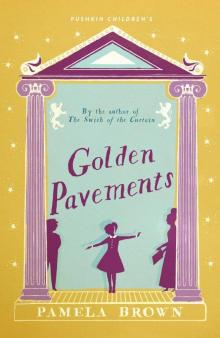 Golden Pavements
Golden Pavements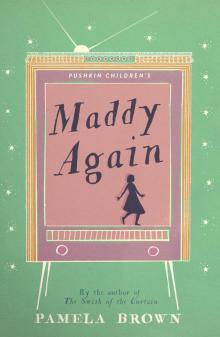 Maddy Again
Maddy Again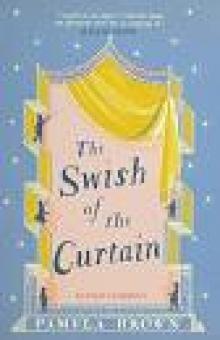 The Swish of the Curtain (Blue Door Book 1)
The Swish of the Curtain (Blue Door Book 1)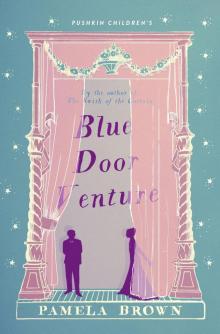 Blue Door Venture
Blue Door Venture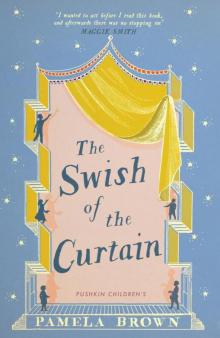 The Swish of the Curtain
The Swish of the Curtain